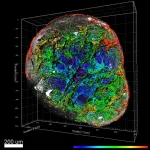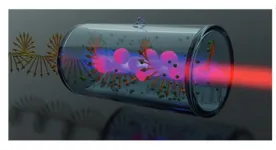(Press-News.org) A new study may offer a strategy that mitigates negative side effects associated with intravenous injection of nanoparticles commonly used in medicine.
The study was published today in Nature Nanotechnology.
“Nanotechnology’s main advantage over conventional medical treatments is its ability to more precisely target tissues, such as cancer cells targeted by chemotherapy. However, when nanoparticles are injected, they can activate part of the immune system called complement,” said senior author Dmitri Simberg, Ph.D., professor of Nanomedicine and Nanosafety at the University of Colorado Skaggs School of Pharmacy on the University of Colorado Anschutz Medical Campus.
Complement is a group of proteins in the immune system that recognize and neutralize bacteria and viruses, including nanoparticles which are foreign to the body. As a result, nanoparticles are attacked by immune cells triggering side effects that include shortness of breath, elevated heart rate, fever, hypotension, and, in rare cases, anaphylactic shock.
“The activation of the immune system after injection of nanoparticles can be challenging to understand and prevent. This research is one step closer to providing a better understanding and a solution for people to receive the benefits of nanoparticles without side effects,” said Simberg, who is also the co-director of the Colorado Center for Nanomedicine and Nanosafety Co-Director.
The researchers say while some progress has been made in mitigating adverse reactions through slow infusion and premedication with steroids and antihistamines, a significant number of people still experience reactions.
“The goal is to prevent, avoid and mitigate adverse reactions and immune activation,” Simberg adds.
To do so, Simberg’s research team collaborated with Michael Holers, M.D., at the University of Colorado School of Medicine and the Medical University of South Carolina to study the impact of complement inhibitors injected with nanoparticles in animal models.
Specifically, the study focuses on an interesting group of complement inhibitors (called “regulators”). The research showed promising results.
Simberg and colleagues observed that the regulators being studied effectively inhibited complement activation by nanoparticles in human serum in vitro and animal models. Specifically, when injected at very low doses, the regulators completely and safely blocked activation of complement by nanoparticles in the animal models used. According to the authors, this is significant because when nanoparticles activate complement, the resulting immune response can not only cause an adverse reaction but it can also reduce the efficacy of nanomedicines.
This research also provides a better understanding of why and how complement regulators could help the body respond more favorably to nanoparticles. The study team observed that of the trillions of nanoparticles entering the blood in a standard injection, only a small fraction activated complement. Complement regulators worked as soon as nanoparticles started activating complement, thereby promptly mitigating immune activation.
“These results suggest we have an exciting opportunity to explore how to further optimize the use of regulators with nanoparticles, with the goal of improving the efficacy and tolerability of multiple nanotechnology-based therapeutics and vaccines,” Simberg said.
The researchers say the next step is to test the complement inhibitors with multiple nanoparticles and in difference disease models to fully understand the potential of this approach with the ultimate goal to apply the research in a clinical setting.
Research reported in this press release was supported by the National Cancer Institute and the National Institute of Allergy and Infectious Diseases of the National Institutes of Health. The content is solely the responsibility of the authors and does not necessarily represent the official views of the National Institutes of Health.
About the University of Colorado Anschutz Medical Campus
The University of Colorado Anschutz Medical Campus is a world-class medical destination at the forefront of transformative science, medicine, education and patient care. The campus encompasses the University of Colorado health professional schools, more than 60 centers and institutes, and two nationally ranked independent hospitals - UCHealth University of Colorado Hospital and Children's Hospital Colorado - that treat more than two million adult and pediatric patients each year. Innovative, interconnected and highly collaborative, the University of Colorado Anschutz Medical Campus delivers life-changing treatments, patient care and professional training and conducts world-renowned research fueled by over $690 million in research grants. For more information, visit www.cuanschutz.edu.
END
New research may make future design of nanotechnology safer with fewer side effects
Study shows a promising strategy to reduce adverse reactions to nanoparticles by using complement inhibitors
2023-10-05
ELSE PRESS RELEASES FROM THIS DATE:
Climate intervention technologies may create winners and losers in world food supply
2023-10-05
A technology being studied to curb climate change – one that could be put in place in one or two decades if work on the technology began now – would affect food productivity in parts of planet Earth in dramatically different ways, benefiting some areas, and adversely affecting others, according to projections prepared by a Rutgers-led team of scientists.
Writing in the journal, Nature Food, the scientists described the results of computer models simulating varying climate scenarios and their impacts over time on the production of the world’s four major food crops: ...
Racial and ethnic disparities in glycemic control among insured adults
2023-10-05
About The Study: In this study of 4,070 insured adults with diabetes, disparities in poor glycemic control persisted despite adjustment for social, health care, and behavioral factors. Research is needed to identify the barriers contributing to poor control even in populations with access to care.
Authors: Sandra S. Albrecht, Ph.D., M.P.H., of the Columbia University Mailman School of Public Health in New York, is the corresponding author.
To access the embargoed study: Visit our For The Media website at this link https://media.jamanetwork.com/
(doi:10.1001/jamanetworkopen.2023.36307)
Editor’s Note: Please see the article ...
Changes in cannabis-attributable hospitalizations following nonmedical cannabis legalization in Canada
2023-10-05
About The Study: This study of 26.9 million individuals in four Canadian provinces found that cannabis legalization with restrictions was not associated with an increase in hospitalizations due to cannabis but commercialization was. The findings suggest that commercialization of cannabis may be associated with increases in cannabis-related health harms, including cannabis-induced psychosis.
Authors: Daniel T. Myran, M.D., M.P.H., of the Ottawa Hospital Research Institute in Ottawa, Ontario, Canada, is the corresponding author.
To ...
Generative AI for chest radiograph interpretation in the emergency department
2023-10-05
About The Study: In a representative sample of emergency department chest radiographs, results suggest that the generative artificial intelligence (AI) model produced reports of similar clinical accuracy and textual quality to radiologist reports while providing higher textual quality than teleradiologist reports. Implementation of the model in the clinical workflow could enable timely alerts to life-threatening pathology while aiding imaging interpretation and documentation.
Authors: Mozziyar Etemadi, M.D., Ph.D., of Northwestern Medicine ...
First epidemiological study links popular weight-loss drugs to stomach paralysis, other serious gastrointestinal conditions
2023-10-05
They’re being hailed as an effective way to lose weight, but diabetes drugs like Ozempic may come with a heightened risk of severe gastrointestinal problems.
That’s according to new research from the University of British Columbia showing that medications known as GLP-1 agonists—which includes brands like Wegovy, Ozempic, Rybelsus and Saxenda—are associated with an increased risk of serious medical conditions including stomach paralysis, pancreatitis and bowel obstruction.
While previous studies highlighted some of these risks in patients with diabetes, this is the first large, population-level study to examine adverse gastrointestinal ...
Human vascular organoids reveal clues for a potential COVID treatment
2023-10-05
When the new SARS-CoV-2 virus began killing thousands of people every week, physicians and scientists around the globe raced to learn why the new pathogen was so deadly. Among many early findings, experts noted that the infection played havoc with blood circulation, both inflaming the linings of blood vessels and making the blood itself more likely to form dangerous clots.
Critically ill COVID-19 patients suffered pulmonary embolisms, deep vein thrombosis (DVT), arterial thrombosis, as well as microvascular thrombosis affecting tissues of the lungs, kidneys, and heart.
Doctors tried a wide array of existing medications in hopes of controlling the blood system impacts, with mixed ...
New research sheds light on genetics of placenta growth and link to preeclampsia in mother
2023-10-05
New research has shed light on how genetics influences the growth of the placenta, revealing a link to risk of disease in the mother.
Scientists from the University of Exeter worked with colleagues in Norway and Denmark to lead a largescale international collaboration which examined placental growth in the greatest detail yet. They caried out the first ever genome-wide association study of the weight of the placenta at birth, generating a number of revelations. Among the findings published in Nature Genetics, the team concluded that faster growth of the placenta can contribute to risk of preeclampsia, and to earlier delivery ...
The medicine of the future could be artificial life forms
2023-10-05
Creating artificial life is a recurring theme in both science and popular literature, where it conjures images of creeping slime creatures with malevolent intentions or super-cute designer pets. At the same time, the question arises: What role should artificial life play in our environment here on Earth, where all life forms are created by nature and have their own place and purpose?
Associate professor Chenguang Lou from the Department of Physics, Chemistry, and Pharmacy, University of Southern Denmark, together with Professor Hanbin Mao from Kent State University, is the parent of a special artificial hybrid molecule that could lead to ...
Scientists discover the highest energy gamma-rays ever from a pulsar
2023-10-05
Scientists using the H.E.S.S. observatory in Namibia have detected the highest energy gamma rays ever from a dead star called a pulsar. The energy of these gamma rays clocked in at 20 tera-electronvolts, or about ten trillion times the energy of visible light. This observation is hard to reconcile with the theory of the production of such pulsed gamma rays, as the international team reports in the journal Nature Astronomy.
Pulsars are the left-over corpses of stars that spectacularly exploded in a supernova. The explosions leave behind ...
Discovery made by University of Warsaw scientists may enable network interface for quantum computers
2023-10-05
A team of scientists at the QOT Centre for Quantum Optical Technologies, including a student from the Faculty of Physics (University of Warsaw), made a device capable of the conversion of quantum information between microwave and optical photons. The results of research, published in “Nature Photonics” magazine, highlight a new microwave detection method with possible applications in quantum technologies, as a part of quantum network infrastructure, and in microwave radio-astronomy.
Conversion of quantum information
Whenever you listen to a song on your phone or computer, a conversion of information happens – ...
LAST 30 PRESS RELEASES:
Molecular glue discovery: large scale instead of lucky strike
Insulin resistance predictor highlights cancer connection
Explaining next-generation solar cells
Slippery ions create a smoother path to blue energy
Magnetic resonance imaging opens the door to better treatments for underdiagnosed atypical Parkinsonisms
National poll finds gaps in community preparedness for teen cardiac emergencies
One strategy to block both drug-resistant bacteria and influenza: new broad-spectrum infection prevention approach validated
Survey: 3 in 4 skip physical therapy homework, stunting progress
College students who spend hours on social media are more likely to be lonely – national US study
Evidence behind intermittent fasting for weight loss fails to match hype
How AI tools like DeepSeek are transforming emotional and mental health care of Chinese youth
Study finds link between sugary drinks and anxiety in young people
Scientists show how to predict world’s deadly scorpion hotspots
ASU researchers to lead AAAS panel on water insecurity in the United States
ASU professor Anne Stone to present at AAAS Conference in Phoenix on ancient origins of modern disease
Proposals for exploring viruses and skin as the next experimental quantum frontiers share US$30,000 science award
ASU researchers showcase scalable tech solutions for older adults living alone with cognitive decline at AAAS 2026
Scientists identify smooth regional trends in fruit fly survival strategies
Antipathy toward snakes? Your parents likely talked you into that at an early age
Sylvester Cancer Tip Sheet for Feb. 2026
Online exposure to medical misinformation concentrated among older adults
Telehealth improves access to genetic services for adult survivors of childhood cancers
Outdated mortality benchmarks risk missing early signs of famine and delay recognizing mass starvation
Newly discovered bacterium converts carbon dioxide into chemicals using electricity
Flipping and reversing mini-proteins could improve disease treatment
Scientists reveal major hidden source of atmospheric nitrogen pollution in fragile lake basin
Biochar emerges as a powerful tool for soil carbon neutrality and climate mitigation
Tiny cell messengers show big promise for safer protein and gene delivery
AMS releases statement regarding the decision to rescind EPA’s 2009 Endangerment Finding
Parents’ alcohol and drug use influences their children’s consumption, research shows
[Press-News.org] New research may make future design of nanotechnology safer with fewer side effectsStudy shows a promising strategy to reduce adverse reactions to nanoparticles by using complement inhibitors



